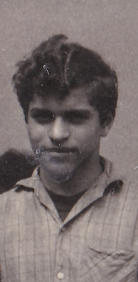A Roma boy wanted to be a mineworker. Mom knocked it out of him, and he‘s a musician.

Stáhnout obrázek
Ota Maňák was born on 26 October 1952 in Rýmařov. He doesn‘t know his real parents. He only knows their names and that the mother was a young Roma woman. He spent two years in a children’s home in Rýmařov. Then he was adopted by Josef and Blažena Maňák. He has their last name. The family lived in the village of Malé Šťáhle near Rýmařov, where his father used horses to collect wood at the local sawmill. The parents then both worked in the local unified agricultural cooperative. In 1962, they moved to the village of Dolní Lutyně near Bohumín. Here, the parents worked in agriculture on a state farm located in a secluded area. Ota Maňák had been playing the guitar since he was 14 years old. After elementary school, he completed a two-year apprenticeship as a steel rope winder at the Bohumín Ironworks and Wireworks. He served his basic military service as a border guard in the Levárky area near Bratislava on the Czechoslovak-Austrian border. After his basic military service, he started working in the Bohumín Ironworks and Wireworks. He also engaged a lot in music. He played guitar in the bands Akord and Orion. He got married and had a daughter and a son. Later, he started composing his own music for a children’s theatre group, and gradually the vocal group Sluníčko was formed. Ota Maňák accompanied them on guitar. At the end of the eighties, Sluníčko was already giving concerts all over Czechoslovakia. At that time, Ota Maňák divorced his first wife and married a second wife, who sang in the band Sluníčko. After 1989, there were fewer concert opportunities, and Ota Maňák started a business. He started a carpentry business with two partners. The business was not successful. Ota Maňák then had to support himself through manual labour for some time. Finally, he returned fully to music. He started performing with Sluníčko again, and the group released their own CD. He writes songs for Sluníčko and composes scenic music for an amateur theatre. He also composed a children’s opera. He cooperates with the Moravian-Silesian National Theater in Ostrava. In 1995, he performed as a musician in the play Ballad for a Bandit. He played as an actor for 12 years in the very successful performance “Do naha” (Strip naked, trans.) or as Ostrava people say “Holé dupy” (Bare ass, trans.). He also had solo performances with the guitar. In 2022, he lived in Bohumín.












